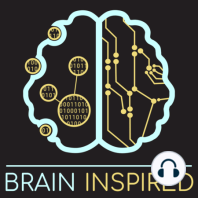57 min listen
BI 165 Jeffrey Bowers: Psychology Gets No Respect
FromBrain Inspired
ratings:
Length:
99 minutes
Released:
Apr 12, 2023
Format:
Podcast episode
Description
Check out my free video series about what's missing in AI and Neuroscience
Support the show to get full episodes and join the Discord community.
Jeffrey Bowers is a psychologist and professor at the University of Bristol. As you know, many of my previous guests are in the business of comparing brain activity to the activity of units in artificial neural network models, when humans or animals and the models are performing the same tasks. And a big story that has emerged over the past decade or so is that there's a remarkable similarity between the activities and representations in brains and models. This was originally found in object categorization tasks, where the goal is to name the object shown in a given image, where researchers have compared the activity in the models good at doing that to the activity in the parts of our brains good at doing that. It's been found in various other tasks using various other models and analyses, many of which we've discussed on previous episodes, and more recently a similar story has emerged regarding a similarity between language-related activity in our brains and the activity in large language models. Namely, the ability of our brains to predict an upcoming word can been correlated with the models ability to predict an upcoming word. So the word is that these deep learning type models are the best models of how our brains and cognition work.
However, this is where Jeff Bowers comes in and raises the psychology flag, so to speak. His message is that these predictive approaches to comparing artificial and biological cognition aren't enough, and can mask important differences between them. And what we need to do is start performing more hypothesis driven tests like those performed in psychology, for example, to ask whether the models are indeed solving tasks like our brains and minds do. Jeff and his group, among others, have been doing just that are discovering differences in models and minds that may be important if we want to use models to understand minds. We discuss some of his work and thoughts in this regard, and a lot more.
Website
Twitter: @jeffrey_bowers
Related papers:
Deep Problems with Neural Network Models of Human Vision.
Parallel Distributed Processing Theory in the Age of Deep Networks.
Successes and critical failures of neural networks in capturing human-like speech recognition.
0:00 - Intro
3:52 - Testing neural networks
5:35 - Neuro-AI needs psychology
23:36 - Experiments in AI and neuroscience
23:51 - Why build networks like our minds?
44:55 - Vision problem spaces, solution spaces, training data
55:45 - Do we implement algorithms?
1:01:33 - Relational and combinatorial cognition
1:06:17 - Comparing representations in different networks
1:12:31 - Large language models
1:21:10 - Teaching LLMs nonsense languages
Support the show to get full episodes and join the Discord community.
Jeffrey Bowers is a psychologist and professor at the University of Bristol. As you know, many of my previous guests are in the business of comparing brain activity to the activity of units in artificial neural network models, when humans or animals and the models are performing the same tasks. And a big story that has emerged over the past decade or so is that there's a remarkable similarity between the activities and representations in brains and models. This was originally found in object categorization tasks, where the goal is to name the object shown in a given image, where researchers have compared the activity in the models good at doing that to the activity in the parts of our brains good at doing that. It's been found in various other tasks using various other models and analyses, many of which we've discussed on previous episodes, and more recently a similar story has emerged regarding a similarity between language-related activity in our brains and the activity in large language models. Namely, the ability of our brains to predict an upcoming word can been correlated with the models ability to predict an upcoming word. So the word is that these deep learning type models are the best models of how our brains and cognition work.
However, this is where Jeff Bowers comes in and raises the psychology flag, so to speak. His message is that these predictive approaches to comparing artificial and biological cognition aren't enough, and can mask important differences between them. And what we need to do is start performing more hypothesis driven tests like those performed in psychology, for example, to ask whether the models are indeed solving tasks like our brains and minds do. Jeff and his group, among others, have been doing just that are discovering differences in models and minds that may be important if we want to use models to understand minds. We discuss some of his work and thoughts in this regard, and a lot more.
Website
Twitter: @jeffrey_bowers
Related papers:
Deep Problems with Neural Network Models of Human Vision.
Parallel Distributed Processing Theory in the Age of Deep Networks.
Successes and critical failures of neural networks in capturing human-like speech recognition.
0:00 - Intro
3:52 - Testing neural networks
5:35 - Neuro-AI needs psychology
23:36 - Experiments in AI and neuroscience
23:51 - Why build networks like our minds?
44:55 - Vision problem spaces, solution spaces, training data
55:45 - Do we implement algorithms?
1:01:33 - Relational and combinatorial cognition
1:06:17 - Comparing representations in different networks
1:12:31 - Large language models
1:21:10 - Teaching LLMs nonsense languages
Released:
Apr 12, 2023
Format:
Podcast episode
Titles in the series (99)
BI ViDA Panel Discussion: Deep RL and Dopamine by Brain Inspired
